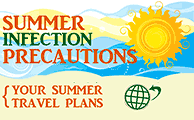Preventing MRSA, Staph and other superbugs

Hand washing is important, but most people are unaware that antibacterial soaps contribute to resistant superbugs like MRSA. Credit: CDC/Cade Martin
MRSA and other superbugs are becoming more common and more challenging to treat. Thankfully, there are simple ways to prevent infections and protect yourself from superbugs. There are also ways to make your body less prone to catching infections and keep environmental bacterial under control.
Infection prevention tips & tools
This section of the website is all about MRSA prevention and control. The navigation menu on the left and the links below will answer your questions about Staph prevention and give you the knowledge and the tools you need to protect yourself and your family.

MRSA cleaning and disinfecting
Because superbugs like MRSA and Staph can live on surfaces in your home, an important part of any prevention strategy is proper disinfecting and cleaning.

Hand washing do’s and dont’s
Hand washing is a core part of your Staph infection prevention efforts. However, most people have poor handwashing habits that just don’t kill enough bacteria to protect you.

Airborne MRSA bacteria
While superbugs can spread in many ways, some like MRSA have been proven to pass through the air. Learn more about the risks and prevention tips for airborne MRSA here.

Hospital infection prevention
Super bugs got started in hospitals and that’s still the more common place to find them. This information-packed infographic will give you show you 10 tips to prevent hospital Staph, MRSA and other infectious bacteria.

How your immune system protects you
How does your immune system protect you from infections? Find out 6 key ways your body wards off infections.
Prevention tips
Part of a good overall approach to controlling superbugs is keeping your home clean, especially if someone has an active infection. Personal hygiene is also important to prevent spreading it to others, or protecting yourself from others who are infected.
If you are infected:
- Wash hands regularly with simple soap and water to keep them clean (hand washing is one of the best ways to prevent spreading Staph and other diseases).
- Don’t share your towels, razors or other personal items as they will have MRSA on them.
- Keep breaks in your skin clean and covered and watch for signs of infection such as redness, warmth and swelling.
- See your doctor if you notice signs of the disease.
- Don’t try to drain a boil yourself at home – it can push the infecting bacteria deeper into your body.
- Keep the infected area covered with a clean dry bandage until it is healed. Wash your hands thoroughly after changing the bandage and put used bandages in the trash.
- Avoid contact with other people’s wounds or bandages. If you must, be sure to wear gloves and proper sanitary technique.
- Disinfect areas where you change your bandages.







